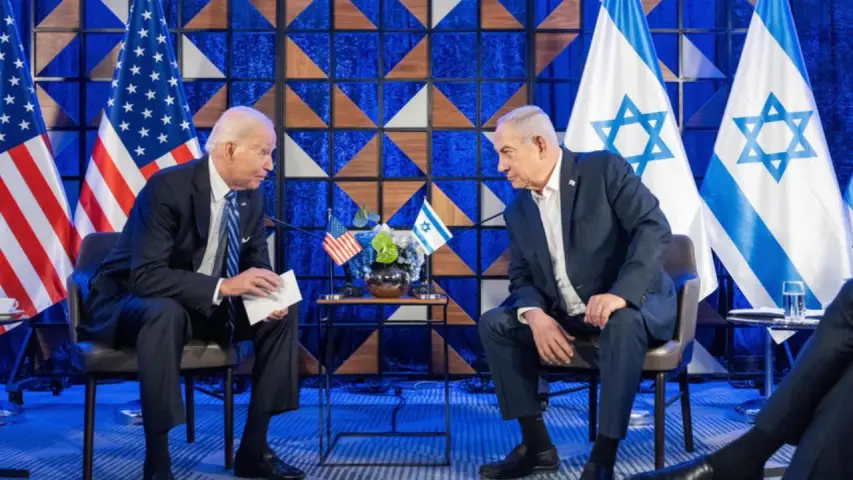

US President Joe Biden meets Israeli Prime Minister Benjamin Netanyahu in the midst of the Hamas-Israel war
Atul Aneja
It is rare to see Arab leaders in unison snubbing a US President on a visit to the heart of the Middle East.
But that just happened on Tuesday when the Jordan’s King Abdullah, Egyptian President Abdel Fattah Al-Sisi and Palestinian leader Mahmoud Abbas refused to meet visiting US President, Joe Biden. The three, each with leverages to impact the festering Gaza crisis, stayed away from a collective meeting in Jordan’s famous capital Amman. The reason—a horrific attack on the Al-Ahli hospital. Nearly 500, including a large number of women and children, were killed in the cruel, and possibly, a tide turning strike.
The bombing triggered a Tsunami of opinion in the Arab Street against Israel and the United States, the guarantor of Tel Aviv’s security. In popular perception, Israel had ordered the attack, drowning out Tel Aviv’s riposte that it was not its forces, but the militant pro-Iran Islamic Jihad that had launched the missile, which had misfired. And when Biden blundered by saying that it appeared that not Israel but the “other team” had perpetrated the gut-wrenching crime, it was game-over for America among billions residing across the globe, who had been sickened by the hospital attack.
Unsurprisingly, not one Arab nation, including US allies—the United Arab Emirates (UAE), Morocco or Bahrain—caveated a response that would sow doubts about Israel’s culpability.
The UAE and Bahrain, which both established ties with Israel nested under the 2020 Abraham Accords, condemned the “Israeli” attack, which took place at a time when Tel Aviv had besieged Gaza.
The heart-rendering consternation was triggered last Saturday by Hamas cadres when they invaded Israeli settlements near Gaza. The attackers killed nearly 1500 Israelis, a shocking statistic in a country which prides itself as a security state. An estimated 150 were kidnapped and turned hostage in embattled Gaza. Many Americans and others with dual-nationality were also taken captive.
However, the balance of perceptions seemed to have turned in favour of the Palestinians in the aftermath of the deadly hospital bombing and the resultant carnage.
“The United Arab Emirates strongly condemns the Israeli attack… resulting in the death and injury of hundreds of people,” the UAE’s official WAM news agency said early on Wednesday.
Bahrain’s foreign ministry also “expressed the Kingdom of Bahrain’s condemnation and strong denunciation of the Israeli bombing”, the Bahrain News Agency said.
Morocco, a north African state that recognised Israel, also blamed Israel for the strike. So did Egypt, the regional heavyweight that borders Gaza, and whose role would be critical in pumping humanitarian supplies to the coastal strip.
Egyptian President Abdel Fattah al-Sisi strongly condemned “the Israeli bombing” of the Ahli Arab hospital, which killed “hundreds of innocent victims” in Gaza.
He called the “deliberate bombing” a “clear violation of international law”.
Saudi Arabia, too labelled the blast as a “heinous crime committed by the Israeli occupation forces”.
Jordan, which borders Israel said that the Jewish state “bears responsibility for this grave incident”. The Organization of the Islamic Conference (OIC), slammed Israel for perpetrating “a war crime, a crime against humanity, and organised state terrorism”.
While President Biden was firefighting at ground-zero in Israel, in faraway Beijing, where he had participated in the BRI forum, Russian President Vladimir Putin was ahead–talking about permanently ending the Israel-Palestine conflict, with the Gaza hospital bombing in the background.
“As for the attack on the hospital, the tragedy that occurred there, it is a terrible event, hundreds of dead, hundreds of wounded. This is, of course, a catastrophe,” Putin told reporters in Beijing after attending the third Belt and Road Forum and meeting with Chinese President Xi Jinping.
He said that he expected that the bombing would be a signal to “end the conflict as soon as possible” and begin “some contacts and negotiations.”
Putin stressed that Russia had always favoured an independent Palestinian state with its capital in East Jerusalem.
The appearance of an independent Palestine on the map will set the conditions for “a lasting peace”—a position that stood tall amid the kinetics of anger, vendetta and tragedy.
Also Read: Has Biden launched ‘mission impossible’ during his visit to Israel in the thick of war?
Union Minister for Environment, Forest and Climate Change, Bhupender Yadav on Friday chaired an Interactive…
The Voice for Baloch Missing Persons (VBMP) has demanded the swift release of two Baloch…
The Israeli Defence Forces shared that on Thursday night it targeted the missiles manufacturing sites…
Prime Minister Narendra Modi is set to flag off the Vande Bharat Express connecting Patliputra…
Ranked 4th among the world's five largest economies, India holds a critical position in shaping…
Ahead of the International Day of Yoga, Saima Wazed, Regional Director for WHO South-East Asia…